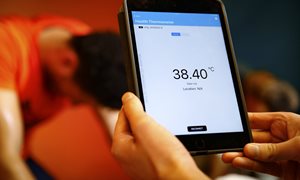
During a regular day, the average person sits for 8-10 hours. These high levels of sitting time seem linked to an increased risk for both cardiovascular and cerebrovascular diseases.
Yvonne Hartman and colleagues, first found that 3 hours sitting directly results in a lower blood flow in the brain and decreased vascular function in the legs. Interestingly, these effects were absent when sitting was interrupted by 2 minutes walking every half-an-hour. Secondly, in co-creation with participants, the investigators developed a personalized intervention using a pedometer that provides biofeedback through vibration when sitting longer than 30-minutes.
In 24 individuals with increased cardiovascular risk, this intervention successfully reduced daily sitting time by 1 hour/day across a 16-week intervention. Moreover, the investigators reported an improvement in vascular structure and function, and a larger cerebral blood flow after the intervention. These results suggest that reducing sitting time is feasible, even in a group with increased risk for chronic disease. This highlights that reducing sitting time is a novel and potentially successful approach to reduce risk for cardiovascular and cerebrovascular diseases.
Publication
Long-Term and Acute Benefits of Reduced Sitting on Vascular Flow and Function
HARTMAN, YVONNE A. W.1; TILLMANS, LAURA C. M.1; BENSCHOP, DAVID L.1; HERMANS, ASTRID N. L.1; NIJSSEN, KEVIN M. R.1; EIJSVOGELS, THIJS M. H.1; WILLEMS, PETER H. G. M.2; TACK, CEES J.3; HOPMAN, MARIA T. E.1; CLAASSEN, JURGEN A. H. R.4; THIJSSEN, DICK H. J.1,5.
For further information about this research, contact: Yvonne Hartman
Related news items

Grants for heart and kidney research Two awards to Radboudumc in Open Competition ENW-XS
21 July 2022Two researchers from the Radboudumc receive a grant from the NWO within the Open Competition of the Exact and Natural Sciences. They are Thijs Eijsvogels, who studies the heart, and Pieter Leermakers, who studies the kidneys.
read more
Your heart rate as a thermometer Research Olympic athletes will be followed up during 4Daagse
18 July 2022Body temperature can be determined from heart rate. This is what research by the Radboudumc among Olympic athletes shows. Athletes can use this method during training to eventually perform better in the heat. The technique is now being further investigated among participants in the 4Daagse.
read more
Young Investigator Award for Esmée Bakker
14 April 2022 Esmée Bakker received the Young Investigator Award for her abstract ‘Acute and long-term mortality rates among participants of mass-participation sports events versus the general population.’ read more
Esmée Bakker obtained a Marie Skłodowska-Curie grant
29 March 2022 Esmée Bakker obtained a Marie Skłodowska-Curie European Postdoctoral Fellowships (160k) of the Horizon 2020 of the European Union. read more
Exercise program appears to be a good alternative to surgery for chronic chest pain Reduced risk of other conditions, hospitalizations, and mortality
9 December 2021 Patients with chronic chest pain may benefit more from following an exercise program than from surgery in which doctors place a stent. Data from over 18,000 patients show a reduced risk of mortality, hospitalizations and other conditions. read more
